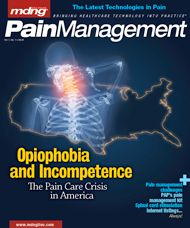Publication
Article
Migraine
//The Educated Patient
National Headache Foundation
For 40 years, the National Headache Foundation has been educating the headache community on the latest research developments and treatments available to deal with the painful condition that affects “More than 29.5 million Americans.” Featured here are NHF blogs, NHF programs, personal migraine headache stories, and CME opportunities for medical professionals, along with tools and research grants. In the headache education section, visitors can use tools for headache sufferers including frequently asked questions and a headache quiz.
Health Communities — Migraine Headaches
Found here is a list of migraine triggers that will be useful to migraine sufferers in learning how to better prevent migraines from occurring. The migraine headaches section of the site offers an overview complete with a description, symptoms, and types of migraines, such as migraine with aura, abdominal migraine, Carotidynia, and Basilar artery migraine. The triggers listed include: alcohol, environmental factors, exertion, caffeine, and nitrates. Additionally, the site also offers information on migraine headache laboratory tests, and naturopathic treatments.
MyMigraineConnection.com — 2010 Year in Review
The year 2011 will surely lead to new research and clinical developments in the understanding of migraine pain, but to honor the work performed in 2010 Health Central has compiled a review of the new information and techniques uncovered last year. Included in this review are these tidbits: “Research was published showing how visual and pain pathways converge in the brain, causing light to exacerbate the pain of a Migraine” and “the FDA approved Botox for the treatment of chronic Migraine.”
Migraine.com
This site contains articles by experts on migraine along with blog posts, tools, symptom maps, a migraine journal that members can log into, and patient stories. Under the Migraine Tools section, visitors can use a symptom checker, a migraine quiz, and a migraine majority.
//Medical Websites
The Migraine Trust
This British Site offers information for both patients and healthcare professionals treating migraine. As part of the goal, the Migraine Trust is designed to “empower, inform, and support those affected by migraine while educating health professionals and actively funding and disseminating research.” The Healthcare Professionals’ section includes information on diagnosing migraine, managing migraine, some guidelines and classification (British), current theories, and current policy issues. While the information is mostly organized around British medicine, physicians may find it useful and thought-provoking.
Women and Migraines — Clinical Fact Sheet
This fact sheet, provided by the Association of Reproductive Health Professionals, describes how and when to treat women with migraines. The piece provides information on the diagnosis of menstrual migraine, acute treatment, prophylactic-short term treatment, and prophylactic-long term. There is also discussion on contraception and migraine symptoms, and migraine and menopause/hormone treatment therapy.
//Online CME
Cybrerounds — Head Defender
Credits: Up to 9.00 available credits.
Fee: Free
Expires: Feb. 15, 2011
Multimedia: Flash/Audio/Video
This activity is an interactive game that “reviews the multifactorial etiology and the pharmacologic treatment of migraine.” The game discusses the pathophysiology of migraine; reviews findings from recent neuroimaging studies; and describes the multi-mechanisms that occur during migraine.”
From the Literature
(comorbid conditions and migraine)
Comorbidity of Migraine with ADHD
Researchers studying the relationship between migraine and ADHD have come to believe that ADHD is a comorbid condition. The team used data from a Norwegian prescription database to study the rate that antimigraine drugs and anti-ADHS drugs were prescribed jointly for patients ages 20 to 50, male and female. The results revealed the connection.
Stroke, Restless Leg Syndrome, and Psychiatric Diseases Often Accompany Migraine
Delineating the “comorbidities of migraine is important, because it can help improve treatment strategies and the understanding of the possible pathophysiology of migraine.” The researchers wrote a piece on what the most common comorbidites of migraine are, including stroke, sub-clinical vascular brain lesions, and coronary heart disease, to help enhance awareness of the connections.
Treating Psychiatric Illness and Migraine
Successful management of headache and migraine headache “requires an integrated approach of neurological and psychiatric management.” The authors of this review delve into the issue of managing migraine, which is often accompanied by comorbid psychiatric illness.
Thought Sleep Apnea and Migraine Were Related? They’re Not
Researchers performed a cross-sectional population-based study on a “random age and gender stratified sample of 40,000 persons aged 20-80 years” in Norway. The results of the study yielded no relationship between migraine with or aura and migraine without to obstructive sleep apnea.
Red Ear Syndrome is a Sign of Migraine in Juvenile Migraineurs
Scientist performed a study that uncovered Red Ear Syndrome and pediatric migraine share a “pathophysiological background” and that RES is a “highly specific sign for migraine.” The study enrolled approximately 226 children that suffered from headache. It showed that RES was “followed more significantly by migraine.”
//Clinical Trials
(women and migraines)
A Multicenter Study to Evaluate the Efficacy of DR-105 for Menstrually-Related Migraine Headaches
Aspirin Resistance in Women With Migraine (ARWM)
Behavioral Weight Loss as a Treatment for Migraine in Overweight Women (WHAM)
Prevention of Menstrual Migraines: Effects of Estrogen Add-back During the HFI in Patients Using Continuous Oral Contraceptives. (Estradiol/MAM)
From the HCPLive Network
HCPLive.com
Migraines, Heart Disease, and Stroke
The first large population-based study to look at the link between migraine and mortality has shown that those who suffer from migraine with aura are at increased risk of dying from all causes, and specifically either heart disease or stroke.
medGadget
Occipital Nerve Stimulation Shows Promise for Migraines
Medtronic reports promising data in a trial of occipital nerve stimulation for chronic migraines. The study, called Occipital Nerve Stimulation for the Treatment of Intractable Migraine (ONSTIM), which seems to have used the Synergy neurostimulation device, showed that 39% of the patients obtained at least a 50 percent decrease in headache days per month or at least a three-point decrease in overall pain intensity from baseline.






